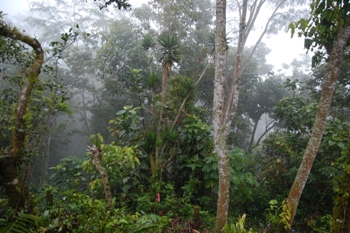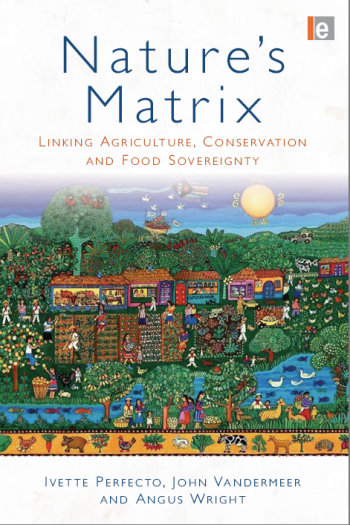How an agricultural revolution could save the world's biodiversity, an interview with Ivette Perfecto
Jeremy Hance
mongabay.com
May 04, 2010
Most people who are trying to change the world stick to one area, for example they might either work to preserve biodiversity in rainforests or do social justice with poor farmers. But Dr. Ivette Perfecto was never satisfied with having to choose between helping people or preserving nature. Professor of Ecology and Natural Resources at the University of Michigan and co-author of the recent book Nature’s Matrix: The Link between Agriculture, Conservation and Food Sovereignty, Perfecto has, as she says, "combined her passions" to understand how agriculture can benefit both farmers and biodiversity—if done right.
Born in Puerto Rico, and working primarily in Central America, Perfecto has been struck by her research that shows agricultural landscapes are capable of containing as much biodiversity—in some cases even more—than rainforests, while continuing deforestation and fragmentation was leading to an untenable situation.
"In the vast coffee landscapes of Costa Rica the biodiversity of insects rivaled that of natural forests at similar elevations, and the isolated patches of rain forest in which we were working in Nicaragua were obviously not sufficient to maintain even the reduced species diversity that existed there. A new paradigm was needed, clearly," she told mongabay.com in an interview.
That new paradigm for Perfecto was combining agroecology farming practices with food sovereignty politics to create a better, more sustainable world.
Agroecology at its root means that farmers work with nature rather than against it.
As Perfecto says, "agroecology is the application of ecological principles to agricultural production, including the activities of the humans involved. Agroecology normally does not include the use of pesticides or excessive use of artificial fertilizers, and is most commonly practiced by small-scale farming operations."
The practice of agroecology, as well as organic farming, not only preserves biodiversity, but also rivals industrialized farming in its output.
"A variety of studies have shown convincingly that organic agriculture is at least as productive as industrial agriculture and according to FAO data, the smaller the farm the more productivity. In other words, if you want to increase production the most efficient way to do so is to break up the mega farms, distribute the land to small-scale farmers and provide training in agroecology," Perfecto says.
While researchers don't know exactly why food production is equal to or even higher on smaller farms rather than big industrialized farms, Perfecto says that "it seems to me that people that own or manage those very large farms know very little about the ecology of their farms and thus are not maximizing the potential of the land. Just think how much land is wasted every time a large combine engine, the size of a small house turns a corner!'"
But, how does one go about achieving food sovereignty?
"First, break up large farms and redistribute them to the more efficient small-scale producers. Second, improve production with more organic and agroecological methods, which could be aided dramatically with an investment of research and development monies," Perfecto says, adding that she would like to see the world's big conservation groups "connect more with small-scale agriculturalists and join in with the movement for land reform and food sovereignty the world over."
In a May 2010 interview mongabay.com spoke with Ivette Perfecto about agroecology and food sovereignty, but also about the global food crisis, the green revolution, and the belief that conservation means vast forming protected areas.
INTERVIEW WITH IVETTE PERFECTO
Mongabay: What is your background?
Ivette Perfecto: I was born and raised in Puerto Rico, but did my graduate training at the University of Michigan. In Puerto Rico I was always fascinated by nature, but intensely concerned about social justice. It was in graduate school that I discovered how to put those two passions together.
Mongabay: You have a new book out called Nature’s Matrix: The Link between Agriculture, Conservation and Food Sovereignty which fits very well with the following interview. What led you to write the book?
Ivette Perfecto: Along with my colleague (and partner) John Vandermeer, we had been working on some ecological issues associated with rain forest preservation on the one hand (mainly in Nicaragua) and with coffee production on the other (mainly in Costa Rica). It rapidly came to our attention that from a wholly ecological point of view, the standard vision of conservation was not only immoral and unethical (which had been many times reported before), but really did not make sense from an ecological perspective either. In the vast coffee landscapes of Costa Rica the biodiversity of insects rivaled that of natural forests at similar elevations, and the isolated patches of rain forest in which we were working in Nicaragua were obviously not sufficient to maintain even the reduced species diversity that existed there. A new paradigm was needed, clearly.
The issue came to a head when I organized a special session at the Latin American Scholars Association talking about the relationship between forest preservation and social justice. I originally organized that session because I had come to be surprised at how little the ecological view was actually appreciated among those concerned with social justice. Yet the perspective we had developed from our ecological work in Costa Rica, Nicaragua and Mexico showed clearly that an interpretation based on modern ecological theory reached the same general conclusions that had been promoted by social justice advocates for so many years.
One of the participants at that conference was Angus Wright, who analyzed the situation from the perspective of an environmental historian. He and I and John got to talking and it seemed like the time was ripe to try and put all of this together in a book. "Nature’s Matrix" thus emerged.
READ THE REST AT: http://news.mongabay.com/2010/0504-hance_perfecto.html
Jeremy Hance
mongabay.com
May 04, 2010
| |
Born in Puerto Rico, and working primarily in Central America, Perfecto has been struck by her research that shows agricultural landscapes are capable of containing as much biodiversity—in some cases even more—than rainforests, while continuing deforestation and fragmentation was leading to an untenable situation.
"In the vast coffee landscapes of Costa Rica the biodiversity of insects rivaled that of natural forests at similar elevations, and the isolated patches of rain forest in which we were working in Nicaragua were obviously not sufficient to maintain even the reduced species diversity that existed there. A new paradigm was needed, clearly," she told mongabay.com in an interview.
| Ivette Perfecto. Photo courtesy of Ivette Perfecto. |
Agroecology at its root means that farmers work with nature rather than against it.
As Perfecto says, "agroecology is the application of ecological principles to agricultural production, including the activities of the humans involved. Agroecology normally does not include the use of pesticides or excessive use of artificial fertilizers, and is most commonly practiced by small-scale farming operations."
The practice of agroecology, as well as organic farming, not only preserves biodiversity, but also rivals industrialized farming in its output.
"A variety of studies have shown convincingly that organic agriculture is at least as productive as industrial agriculture and according to FAO data, the smaller the farm the more productivity. In other words, if you want to increase production the most efficient way to do so is to break up the mega farms, distribute the land to small-scale farmers and provide training in agroecology," Perfecto says.
While researchers don't know exactly why food production is equal to or even higher on smaller farms rather than big industrialized farms, Perfecto says that "it seems to me that people that own or manage those very large farms know very little about the ecology of their farms and thus are not maximizing the potential of the land. Just think how much land is wasted every time a large combine engine, the size of a small house turns a corner!'"
But, how does one go about achieving food sovereignty?
"First, break up large farms and redistribute them to the more efficient small-scale producers. Second, improve production with more organic and agroecological methods, which could be aided dramatically with an investment of research and development monies," Perfecto says, adding that she would like to see the world's big conservation groups "connect more with small-scale agriculturalists and join in with the movement for land reform and food sovereignty the world over."
In a May 2010 interview mongabay.com spoke with Ivette Perfecto about agroecology and food sovereignty, but also about the global food crisis, the green revolution, and the belief that conservation means vast forming protected areas.
INTERVIEW WITH IVETTE PERFECTO
Mongabay: What is your background?
Ivette Perfecto: I was born and raised in Puerto Rico, but did my graduate training at the University of Michigan. In Puerto Rico I was always fascinated by nature, but intensely concerned about social justice. It was in graduate school that I discovered how to put those two passions together.
Mongabay: You have a new book out called Nature’s Matrix: The Link between Agriculture, Conservation and Food Sovereignty which fits very well with the following interview. What led you to write the book?
 Shaded coffee in Mexico. Photo by: Ivette Perfecto. |
The issue came to a head when I organized a special session at the Latin American Scholars Association talking about the relationship between forest preservation and social justice. I originally organized that session because I had come to be surprised at how little the ecological view was actually appreciated among those concerned with social justice. Yet the perspective we had developed from our ecological work in Costa Rica, Nicaragua and Mexico showed clearly that an interpretation based on modern ecological theory reached the same general conclusions that had been promoted by social justice advocates for so many years.
One of the participants at that conference was Angus Wright, who analyzed the situation from the perspective of an environmental historian. He and I and John got to talking and it seemed like the time was ripe to try and put all of this together in a book. "Nature’s Matrix" thus emerged.
READ THE REST AT: http://news.mongabay.com/2010/0504-hance_perfecto.html


0 Comentarios:
Publicar un comentario
Suscribirse a Comentarios de la entrada [Atom]
<< Página Principal